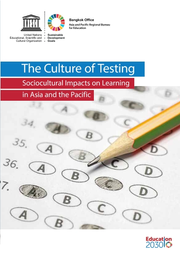
In many countries in Asia and the Pacific, high-stakes examinations are the means for controlling access to better schools, higher education and greater life opportunities. Students are being educated in a world that is highly competitive, stressful and test-focused and the pressure to obtain high scores in tests and exams can come at the expense of other relevant skills needed to navigate an increasingly complex world. Whether academic achievement is of more value than other competencies and learner well-being depends on how different societies interpret the value of education. This study, following on from UNESCO’s 2015 Rethinking Education, and within the SDG4-Education 2030 backdrop, examines the social and cultural values of the quality of education. By examining the relationship between society, culture and the values that are placed on examinations and academic success, this report illuminates what drives societies to rely on tests as a measure of success.
Author(s): UNESCO Bangkok
Year Published: 2018
Language: English
Country: Thailand
Download: https://unesdoc.unesco.org/ark:/48223/pf0000261955_eng


